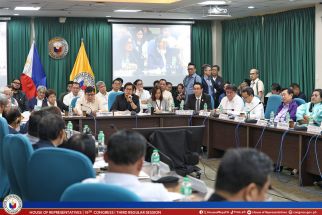Normal for voters to have doubts on poll automation - US poll advocate
MANILA, Philippines - An American election advocate assured the people yesterday that it is normal for voters to have doubts on poll automation, but the Commission on Elections (Comelec) should push through with the computerized elections in 2010 instead of maintaining the manual system.
Kay Maxwell, executive director of the World Affairs Forum, said that it is unusual, even in the United States, for people to immediately have full confidence in a new system like the automated elections.
“Change is difficult (and) we faced exactly the same kind of debates and discussions all across the United States. Different states made different choices in terms of which machines to use so there’s no simple answer to it,” she said in an interview after an election forum organized by the Harvard Club of the Philippines at the Ateneo Professional Schools in Makati City.
Maxwell served as the 16th president of the League of Women Voters of the United States and chair of the League of Women Voters Education Fund from 2002-2006.
She said that since the Philippines is trying a new automated election system in 2010, many people normally have reservations but by working together, they can make the system work.
She said that automated election is the “better way to go.”
“There is no perfect machine. No election system is perfect and machines are only part of what we have to work out well,” Maxwell added.
She believes that security could be built to ensure honest and credible elections despite doubts about the system.
Meanwhile, a local think tank warned voters of a possible failure of elections in 2010 if hackers from all over the world attack the Comelec’s automated poll system.
The Issues and Advocacy Center in a statement urged the Comelec and the appropriate government agencies and Congress to review the operational procedures related to the conduct of the scheduled national elections on May 10, 2010.
Ed Malay, head of the advocacy center and also media coordinator of former President Fidel Ramos, said there is a possibility of failure of elections following reports that hackers worldwide have decided to take up the challenge hurled by Smartmatic-TIM, which offered a reward of P10 million to anyone who can hack into the country’s automated poll system.
Smartmatic-TIM was the firm that won the P11-billion contract to implement the automated polls.
The firm earlier said it will take at least six days for hackers to infiltrate the automated poll system that the firm will use in partnership with the Comelec and by that time the elections would be over. Winners for national and local officials will be proclaimed after only two days.
Malay said the idea of hacking into the Philippine automated poll system was raised but not publicly discussed during the recent DEFCON conference held from July 30 to Aug. 2 at the Riviera Hotel and Casino in Las Vegas “which gathered more than 5,000 computer wizards and those who identify themselves as hackers who paid an admission fee of $120 to participate in the conference.”
Malay said computer experts at the National Computer Center are convinced that the Philippine automated poll system can be hacked.
The Philippines, he said, is most vulnerable to cyber attacks because the country and the government and even private firms do not have an established security mechanism to protect the system.
“DEFCON, which meets annually in the last week of July, is the worldwide association of hackers and computer geeks founded by Jeff Moss, who is known in cyberworld as ‘Dark Tangent’ and is reportedly responsible for the distribution of several viruses that has brought down computer systems worldwide,” Malay said.
He said the United States Homeland Security Administration had appointed Moss a member of the agency’s national advisory council.
“Once the Comelec-Smartmatic-TIM system is infected and/or is attacked, the data stored in their system could be erased and/or corrupted which could lead to a failure of elections in areas affected by the cyber attack if not the entire system nationwide,” he said. – With Paolo Romero
- Latest
- Trending


































